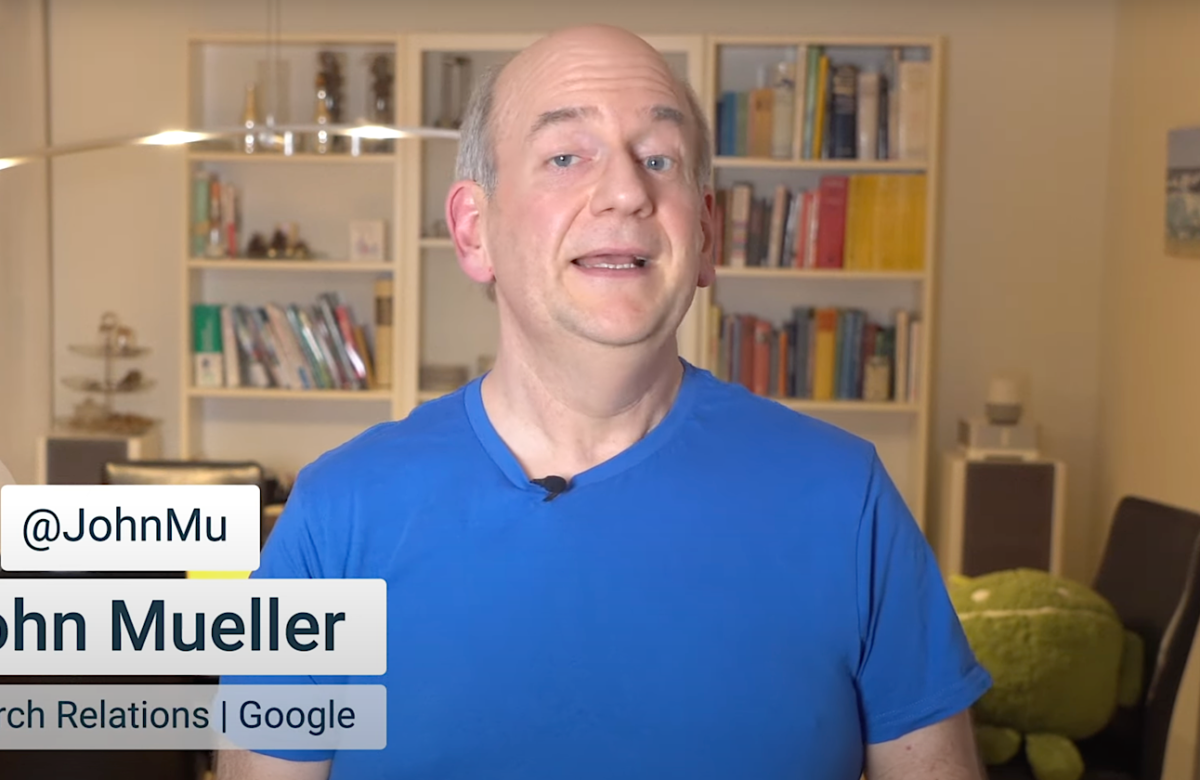
10+ Tips to Build a Better Website
- Digital MarketingNews
- July 14, 2023
- No Comment
- 143
[ad_1]
What Is Website positioning Internet Design?
Incorporating Website positioning in internet design is all about bringing SEO—the follow of enhancing a web site to extend its rankings in search engine outcomes—into the web site designing and constructing course of. Which helps enhance site visitors and enhance the consumer expertise.
And organic ranking factors like mobile-readiness and web site velocity are immediately influenced by web site design.
Google’s personal SEO starter guide even mentions that involving an Website positioning skilled when launching or redesigning a web site design may also help make sure the result’s “search engine-friendly from the underside up.”
Be particularly conscious if you happen to’re working with exterior groups. To ensure any internet design and Website positioning companies you employ are appropriate with one another.
9 Elements to Guarantee Website positioning-Pleasant Internet Design
Contemplate these elements once you’re constructing a web site so it’s able to rank.
1. Cellular-First Design
Google takes a mobile-first approach to crawling, indexing, and rating pages.
This traces up with cellular changing into the primary source of search engine visits. It’s now estimated to be liable for over 60% of all searches, as Statista’s knowledge exhibits:
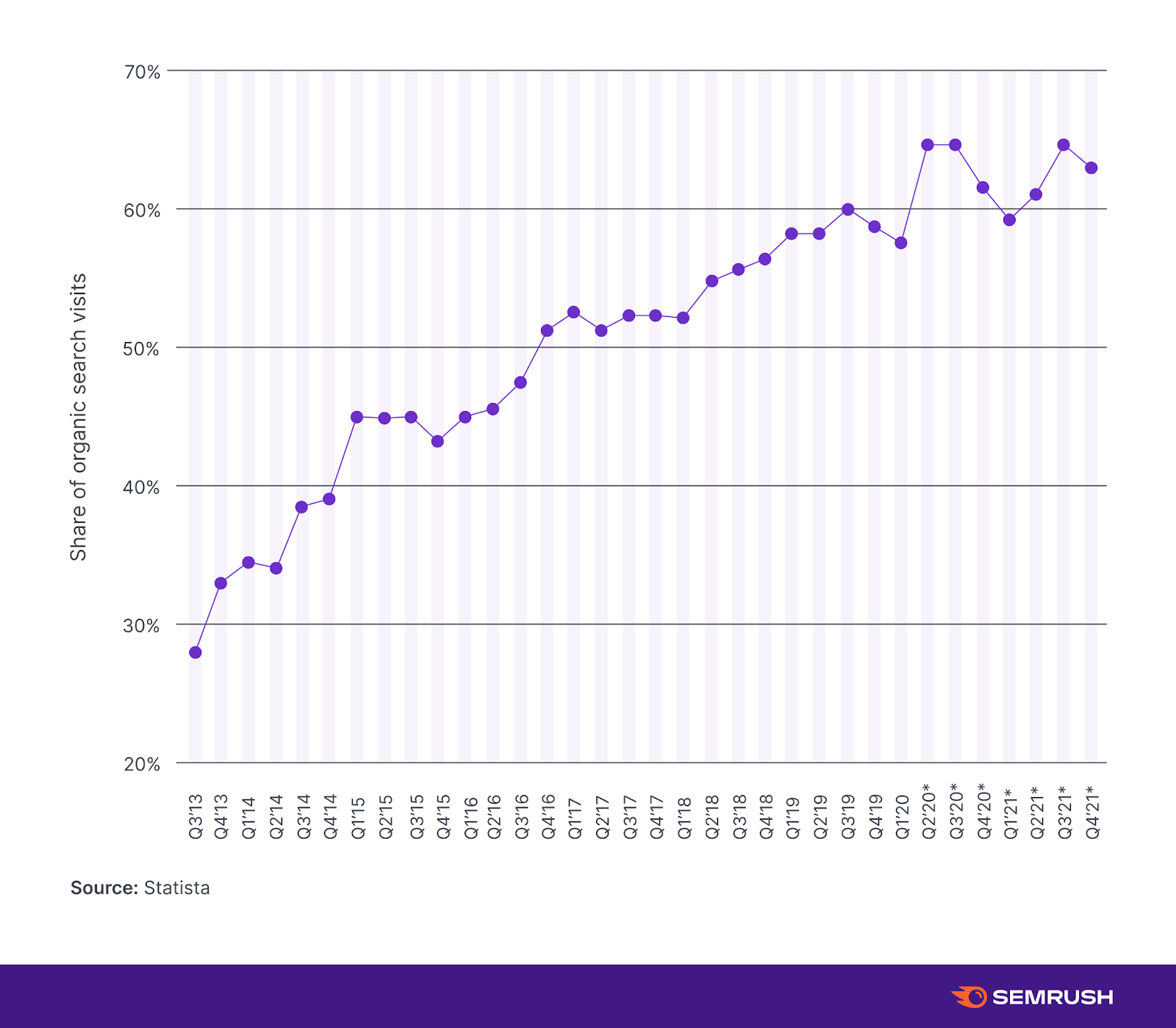
So, it’s vital to use mobile SEO best practices. There are 3 ways to design a mobile-friendly site:
- Dynamic serving: This setup serves completely different variations of the HTML code in keeping with the consumer’s machine. Nevertheless it makes use of the identical URL throughout units.
- Separate URLs: This setup makes use of completely different HTML code on separate URLs for various machine sorts. This method requires extra work to make sure engines like google don’t see these pages on completely different URLs as duplicate content material.
- Responsive design: Responsive design makes use of the identical HTML code and URL for all units, however the format can change based mostly on machine specs. That is the strategy Google recommends.
Right here’s what responsive design seems to be like throughout completely different machine sorts:
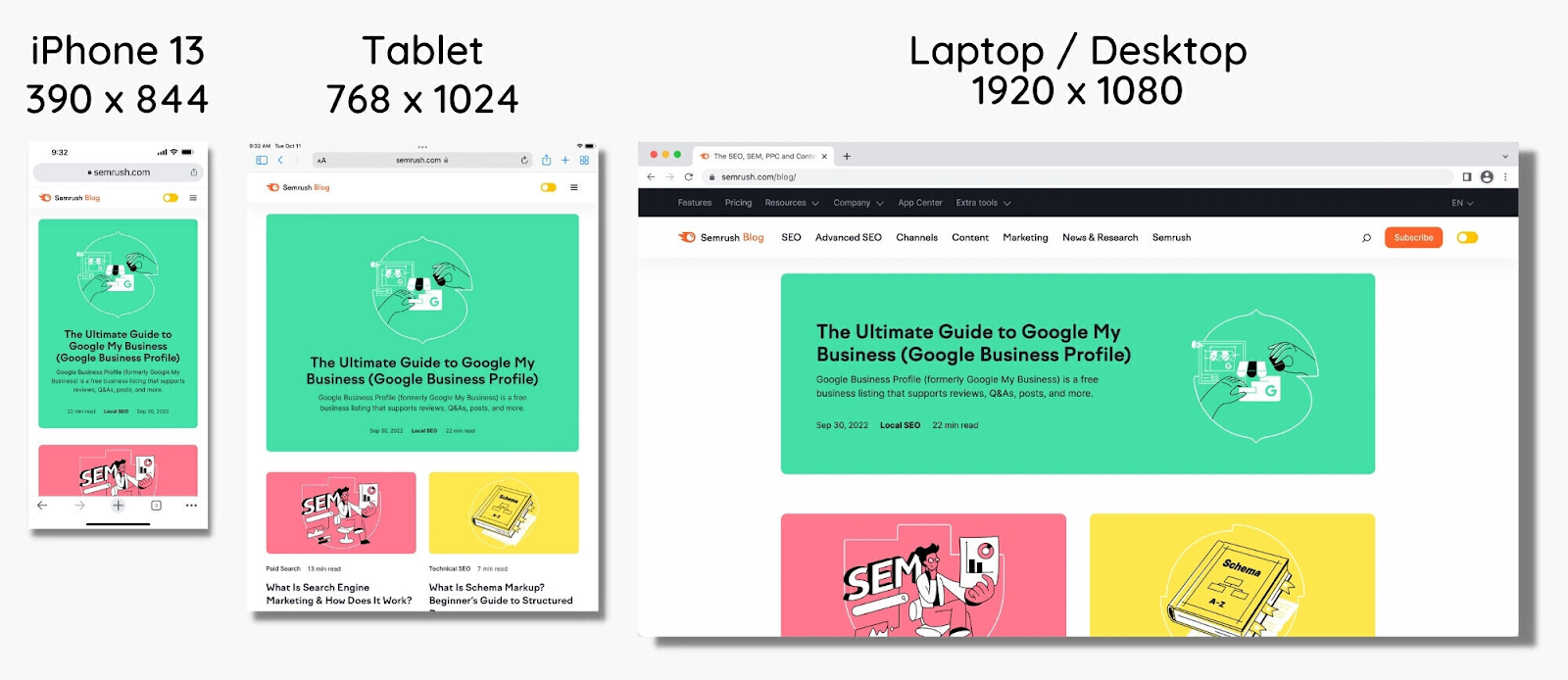
Content material formatting can be vital to think about due to cellular units’ smaller display screen sizes.
Cellular-friendly content material ought to:
- Embody brief paragraphs
- Use an applicable font dimension (16px is really helpful for physique copy)
- Incorporate loads of white house
- Keep away from intrusive pop-ups
- Persist with cellular character limits for meta tags (50-60 characters for title tags and underneath 120 characters for meta descriptions)
Correct content material formatting on cellular ensures that pages are legible and simple to navigate, even on the smallest cellular screens.
Right here’s an instance of a skimmable format on cellular:
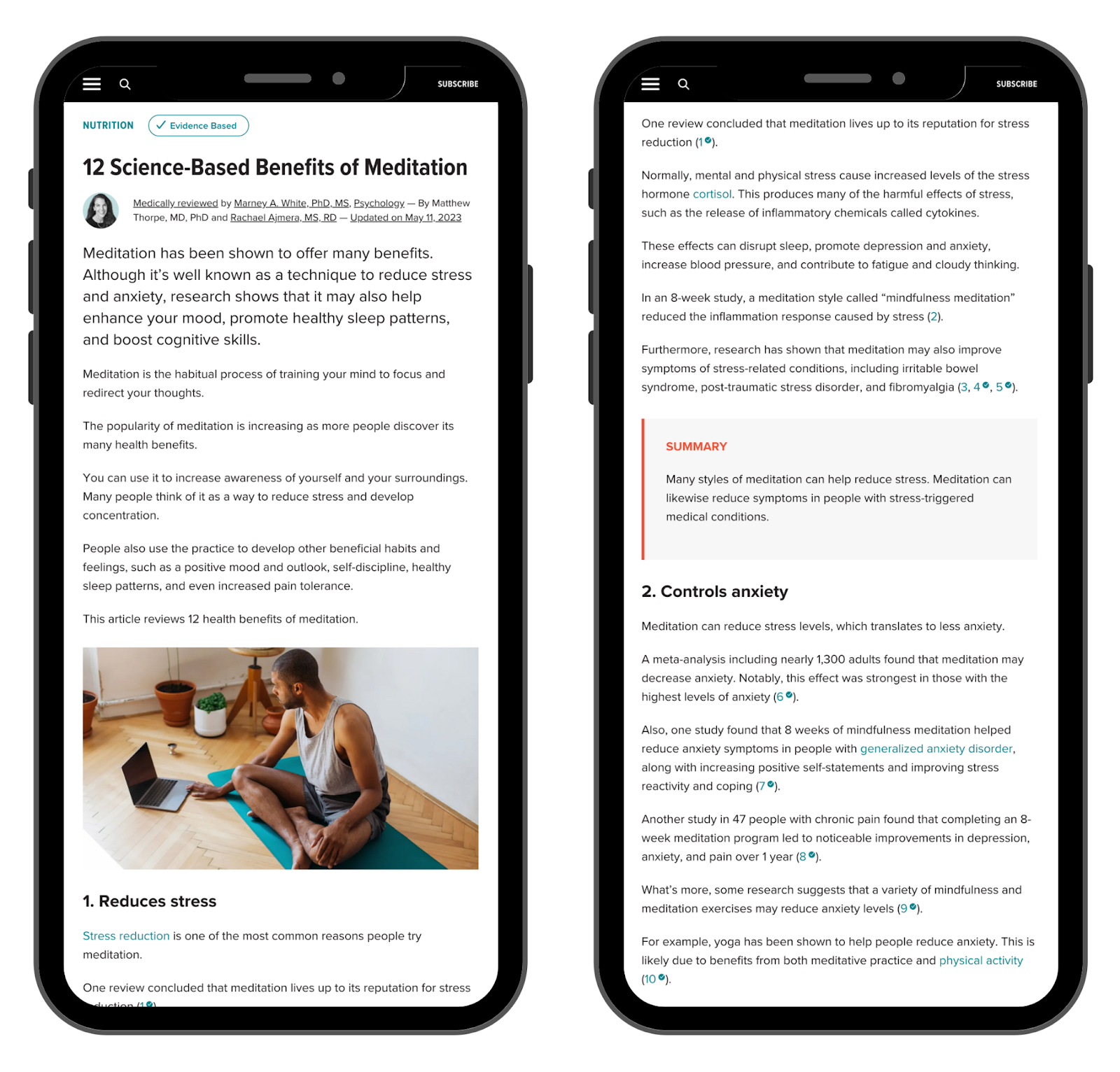
Use Google’s proprietary Mobile-Friendly Test to test how properly your pages carry out from a cellular perspective.
2. Web site Pace
Quick web page load instances prime a web site for Website positioning success.
Page speed is a confirmed Google ranking factor that additionally influences a web page’s bounce fee.
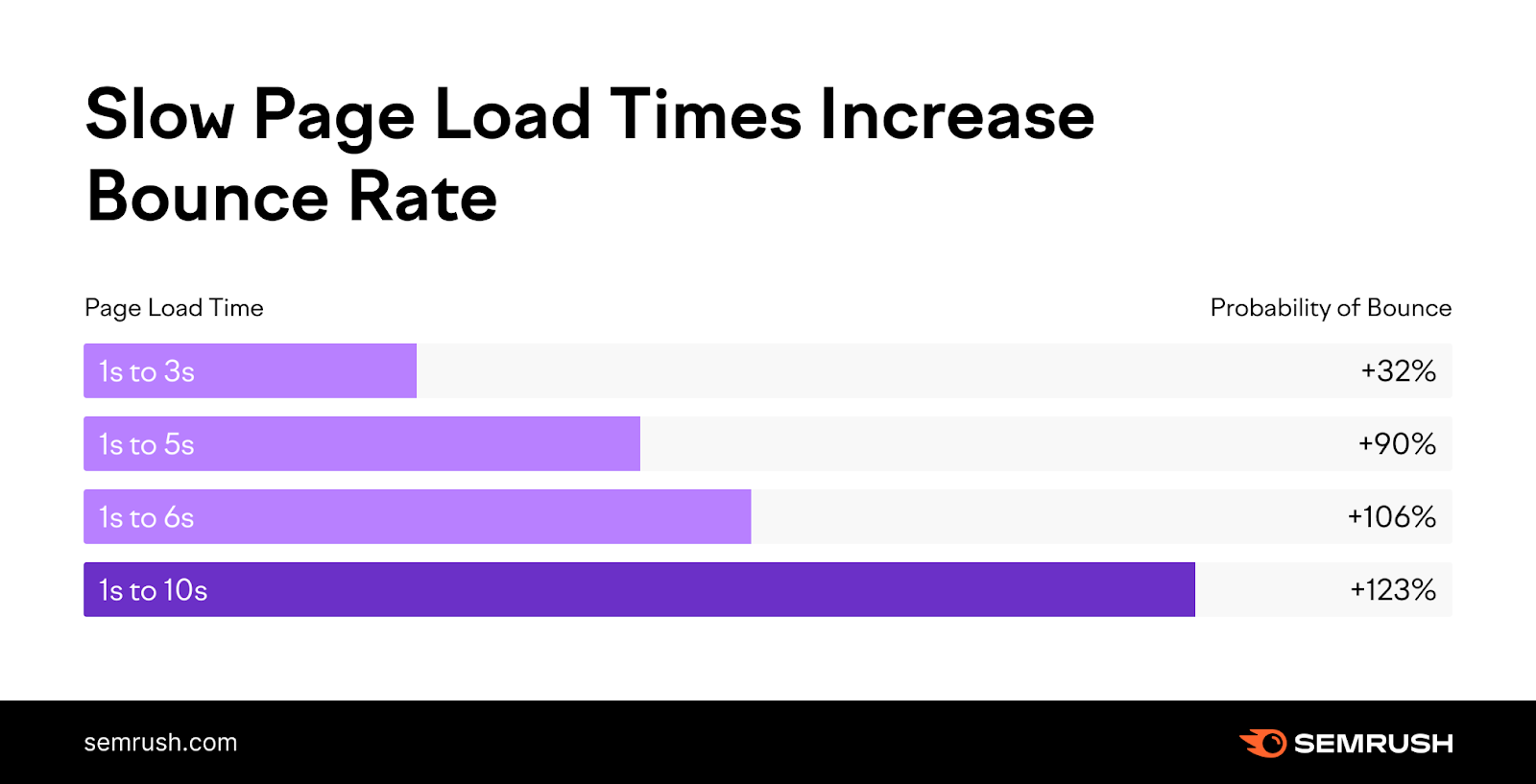
The takeaway?
Shorter load instances imply fewer individuals will bounce out of your web site with out visiting one other web page.
And internet design has an unlimited impression on web site velocity. As a result of the scale of the code dictates how pages load.
There are a selection of strategies to enhance web site velocity, however an important embrace:
- Utilizing the best picture format: JPEGs and PNGs are bulkier than you would possibly count on. The WebP format is a contemporary various that may scale back file sizes by up to 34%.
- Lowering HTTP requests: HTTP requests load web page content material, together with photos, plugin options, and JavaScript. Lowering the variety of requests a browser has to make when loading a web page can considerably enhance web site velocity.
- Enabling browser caching: Enabling caching permits customers’ browsers to retailer components like photos and CSS to lower load instances for return guests.
There are a number of methods to measure web site velocity, however Google’s instruments are a protected wager.
You need to use Google’s PageSpeed Insights instrument to get data on the Core Web Vitals (particular metrics that point out the consumer expertise high quality) for any URL.
The instrument shares these findings in a report:
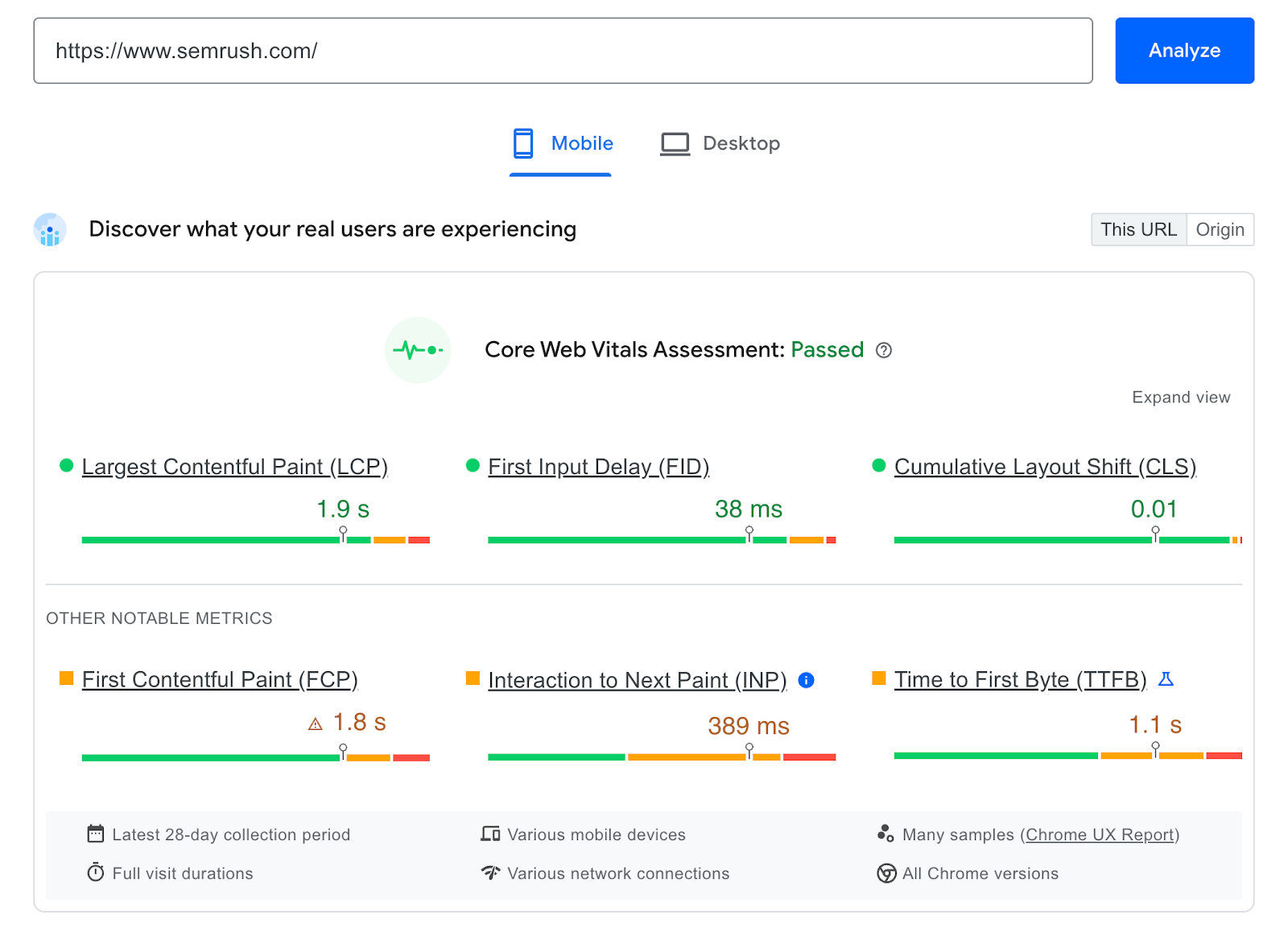
You’ll additionally get particular insights into how you can enhance web page velocity. Plus estimates of how the recommendations will impression load time.
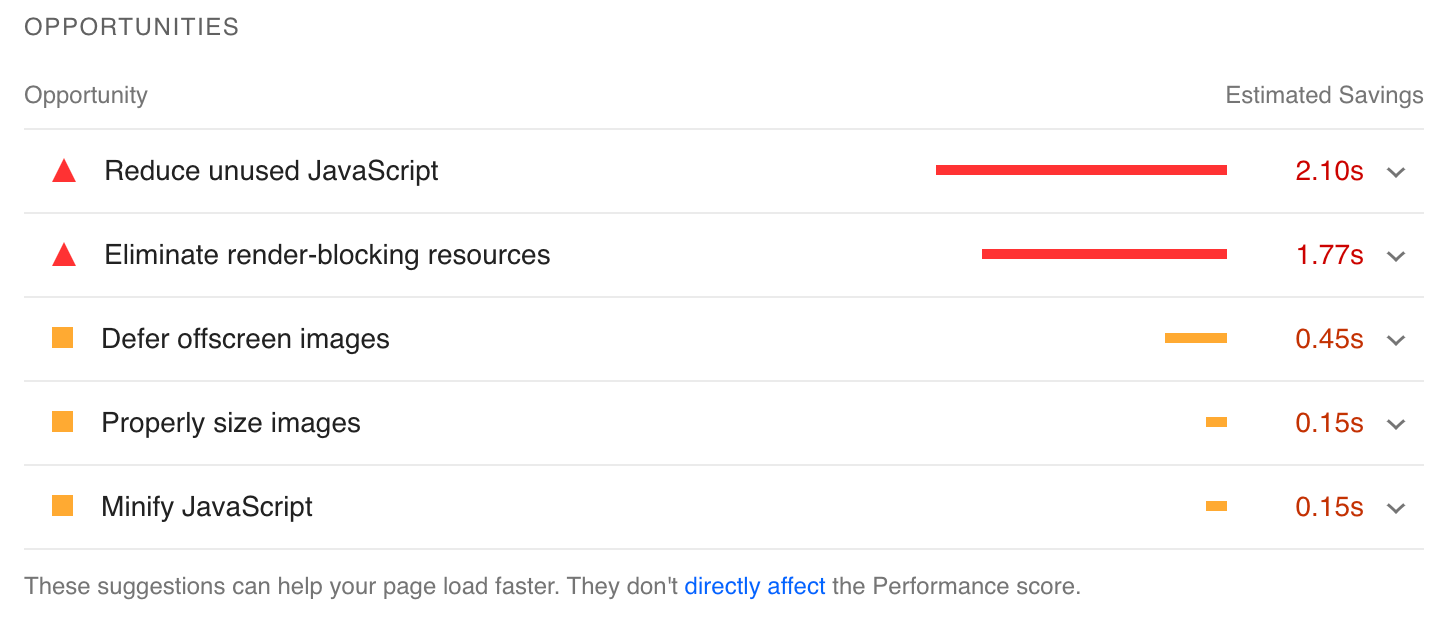
Semrush’s Site Audit instrument presents an much more intensive take a look at web site efficiency metrics.
Go to the Web site Audit instrument, enter your web site URL, and click on “Begin Audit.”
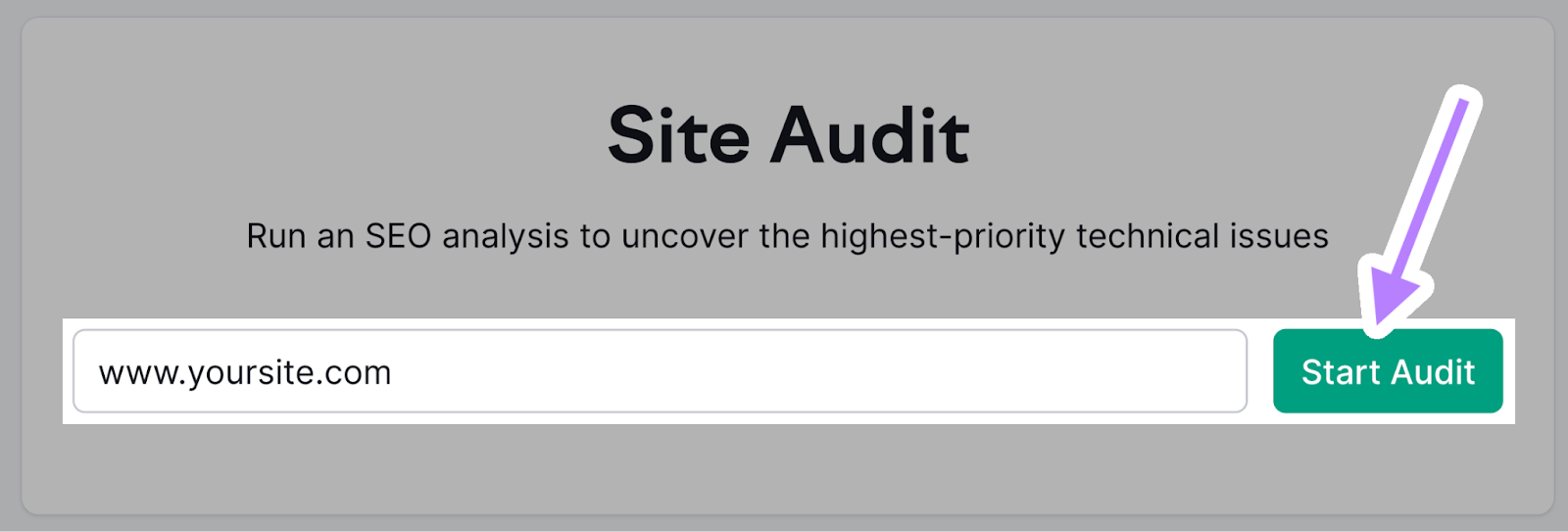
You’ll then see “Web site Audit Settings” within the window that seems.
Subsequent, choose what number of pages you need crawled and select the crawl supply. And click on “Begin Web site Audit.”

When the audit is completed, you’ll get an summary of your web site’s efficiency. And proposals on how you can repair points associated to web site velocity once you click on “Web site Efficiency” or “Core Internet Vitals.”
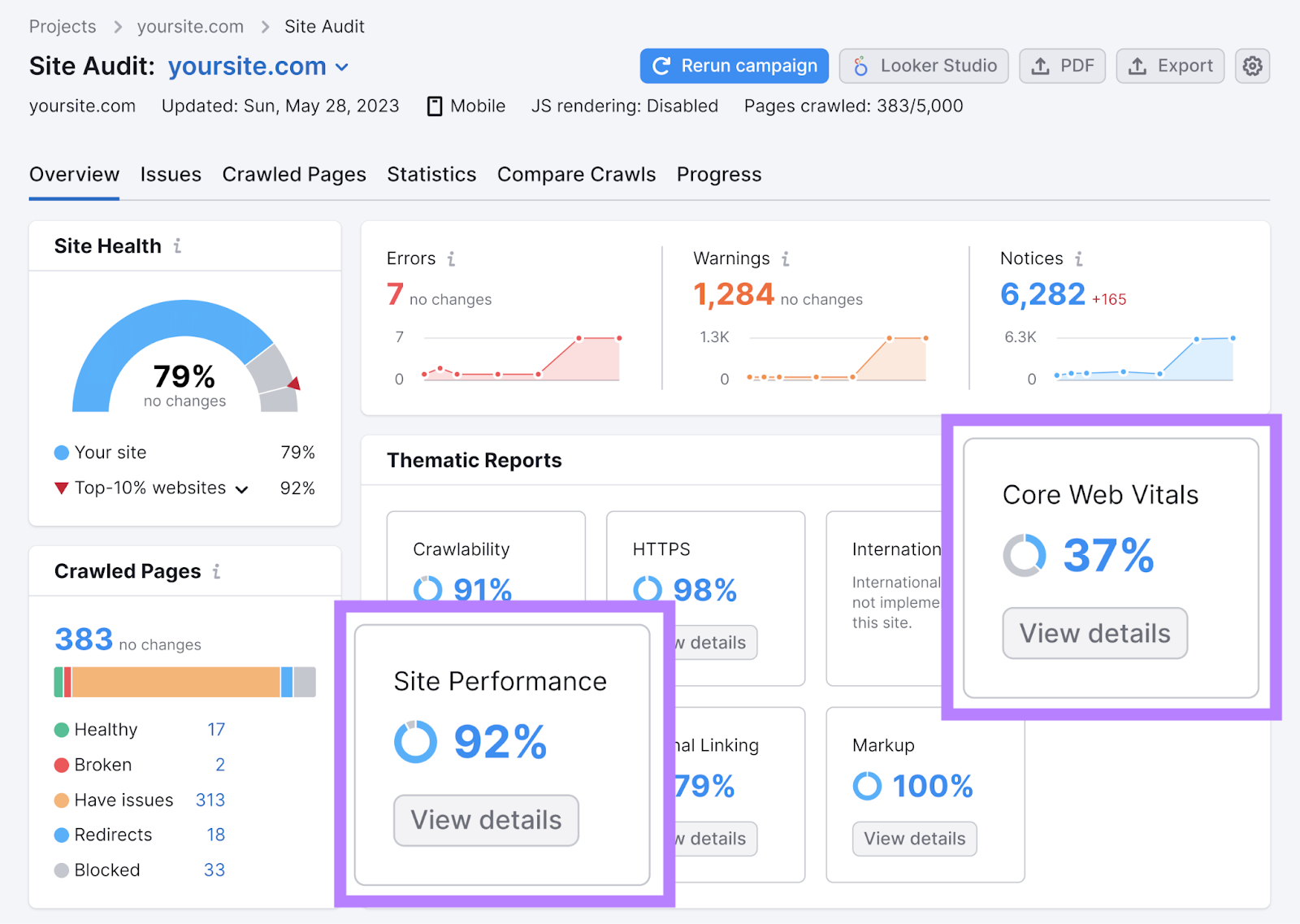
3. Web site Construction
An intuitive web site construction (additionally known as website architecture) provides guests one of the best navigation expertise. And helps engines like google discover and higher perceive your pages.
Finest practices for Website positioning-friendly internet design contain creating content material buckets that teams pages collectively. So extra particular classes are nested underneath extra basic classes.
Like this:
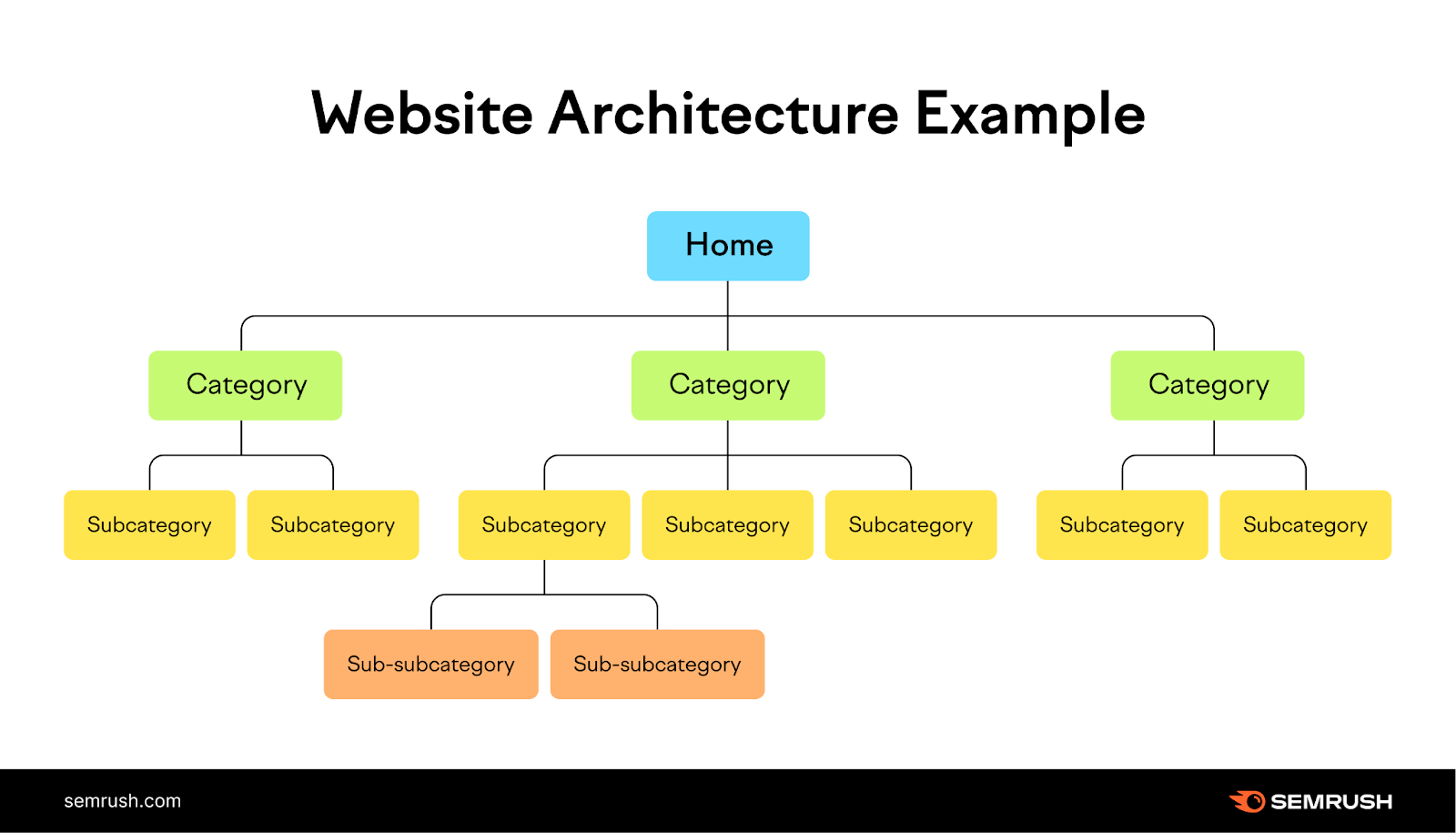
In follow, this allows you to create a URL construction that’s intuitive to navigate.
For instance, on a web site stuffed with content material about completely different canine breeds, a piece of the URL construction would possibly seem like this:
- dogbreeds.com
- dogbreeds.com/terrier
- dogbreeds.com/terrier/yorkshire-terrier
- dogbreeds.com/terrier/yorkshire-terrier/temperament
- dogbreeds.com/terrier/yorkshire-terrier/care-guide
- dogbreeds.com/terrier/yorkshire-terrier/dimension
- dogbreeds.com/terrier/scottish-terrier/
- dogbreeds.com/terrier/scottish-terrier/temperament
- dogbreeds.com/terrier/scottish-terrier/care-guide
- dogbreeds.com/terrier/scottish-terrier/dimension
- dogbreeds.com/terrier/bull-terrier/
- dogbreeds.com/terrier/bull-terrier/temperament
- dogbreeds.com/terrier/bull-terrier/care-guide
- dogbreeds.com/terrier/bull-terrier/dimension
- dogbreeds.com/terrier/yorkshire-terrier
- dogbreeds.com/terrier
Every step down within the web site construction dives right into a extra detailed subcategory of the subject you began with.
One of these intuitive internet design will:
- Make it simpler for engines like google to search out and index your content material
- Assist customers perceive the connection between pages
- Unfold authority throughout the web site by means of contextually related inside hyperlinks
4. Navigation and Inside Hyperlinks
Similar to the web site construction, internal linking helps engines like google perceive your web site construction and aids in consumer navigation.
There are two varieties of inside hyperlinks to think about: navigational and contextual.
Navigational hyperlinks are current site-wide and embrace hyperlinks which might be within the web site header, footer, and navigation bar.
Contextual hyperlinks are present in the primary physique content material of a web page to direct customers to associated content material. They usually’re normally positioned utilizing related anchor text that helps customers perceive what they’re about to click on on.
Like this:

There are just a few vital concerns to bear in mind concerning inside hyperlinks when designing a web site:
- Be certain that all pages have at the least one incoming inside hyperlink to avoiding orphan pages (pages that neither crawlers nor customers can simply attain)
- Use anchor textual content that successfully communicates what the content material on the vacation spot web page is about
- Use breadcrumb links (a path of easy-to-navigate hyperlinks) to assist customers discover their means by means of the location
- Create topic clusters by interlinking pages that include associated content material
Subject clusters could be particularly useful. They’re teams of content material that focus on a primary subject. Utilizing them in your web site provides customers loads of associated content material to discover, conserving them in your web site for longer.
The under picture illustrates subject clustering utilizing a central pillar web page that covers the primary subject. And different items which might be associated (and linked) to it:
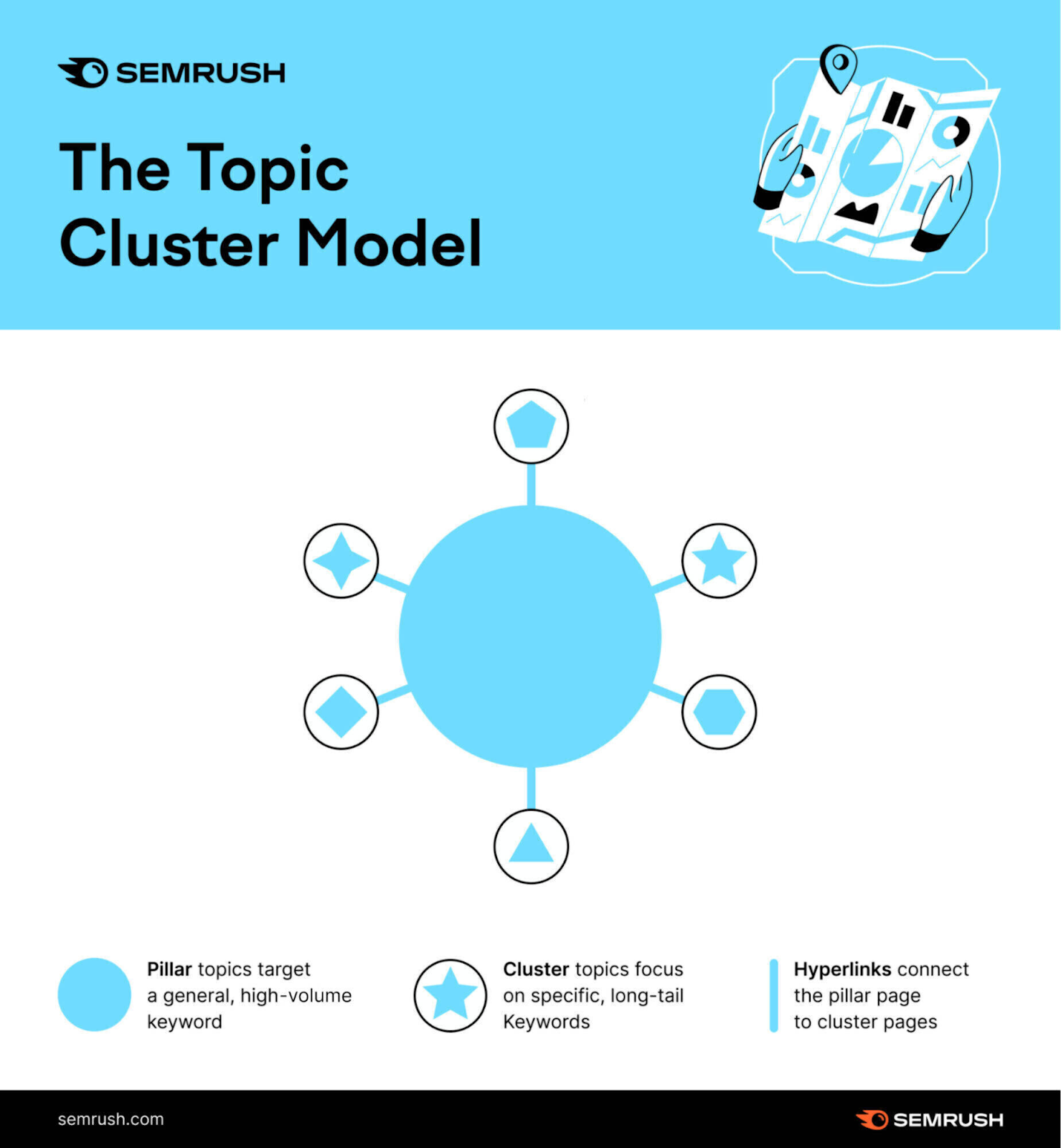
You need to use Semrush’s Site Audit characteristic or an identical instrument to get an summary of your inside linking efficiency.
Run an audit utilizing the identical methodology outlined within the part about web site velocity.
Then, click on “View Particulars” on the “Inside Linking” report back to get data on:
- The crawl depth (what number of hyperlinks deep a web page is from the homepage) of each web page on-site
- Which pages have the least or most inside hyperlinks pointing towards them
- Damaged inside hyperlinks, and how you can repair them
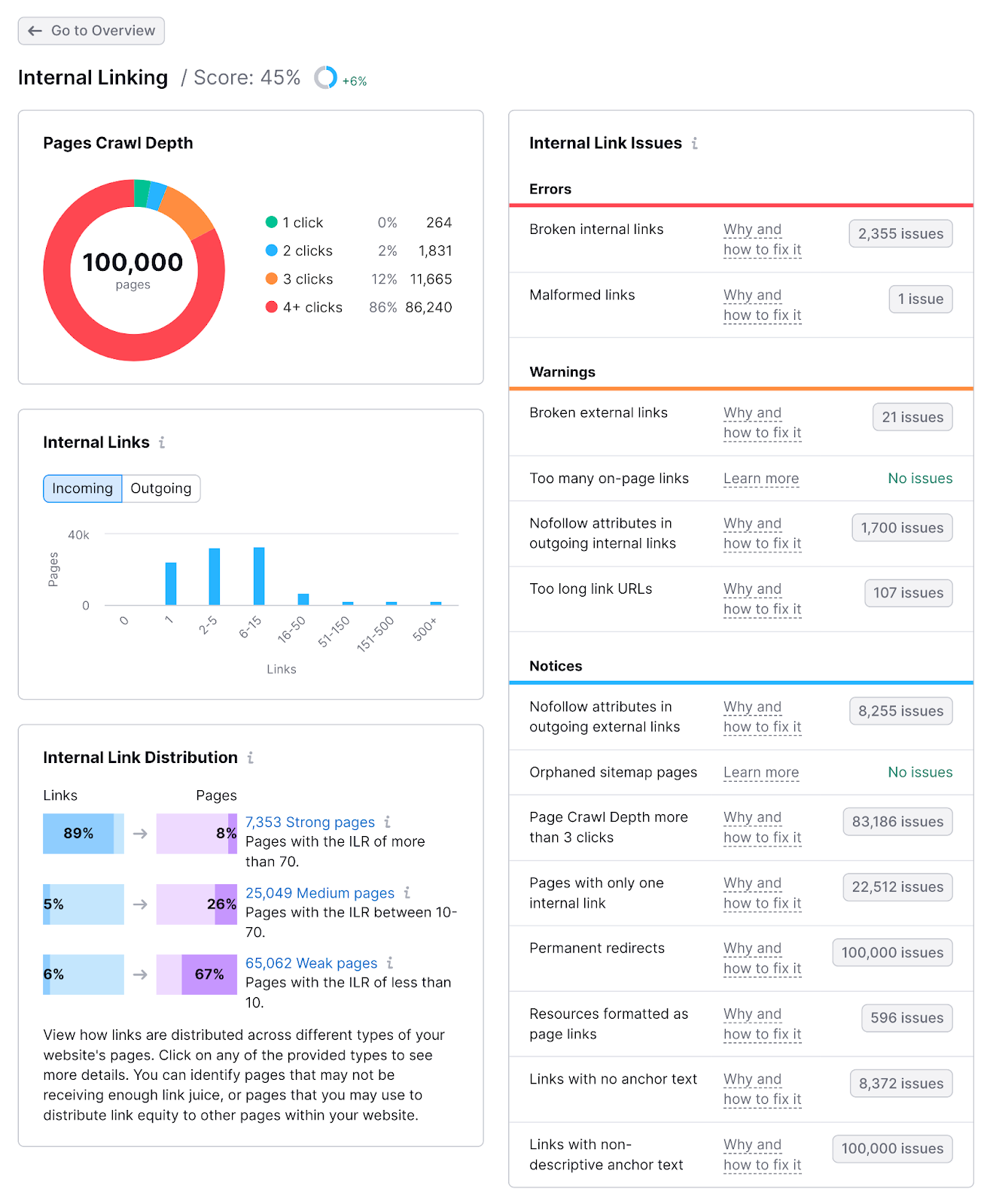
5. Indexability and Crawlability
An Website positioning-friendly web site needs to be designed in a means that makes it straightforward for Google to search out and perceive it. That is what indexability and crawlability are all about.
Crawlability refers to how properly an internet crawler can entry pages throughout a web site. And Google will solely crawl so many pages earlier than it reaches its restrict on your web site.
Poor inside linking and redirect loops can cease crawlers from accessing all of your content material.
Indexability refers to Google’s means to grasp and index content material.
Duplicate content material and not using a specified canonical (or “primary”) web page designated could cause indexability points, as an illustration.
Crawlability and indexability work collectively to serve search outcomes supposed to be probably the most helpful for customers.
A very powerful issues to do to enhance a web site’s crawlability and indexability are:
- Leverage inside linking: You’ll want to be certain crawlers can navigate your web site by means of inside hyperlinks. Be sure that each web page has at the least one incoming hyperlink from one other web page on-site.
- Use noindex tags correctly: You’ll be able to direct Google to keep away from indexing sure pages utilizing robots meta tags. Utilizing these tags retains engines like google from indexing content material that’s not designed for finish customers.
- Submit a sitemap: A sitemap is a small file that lists each vital web page on a web site. Creating one and submitting it by means of Google Search Console ensures crawlers can attain the pages in your web site.
The picture under illustrates what an XML sitemap seems to be like. It exhibits how the web site is break up into classes.
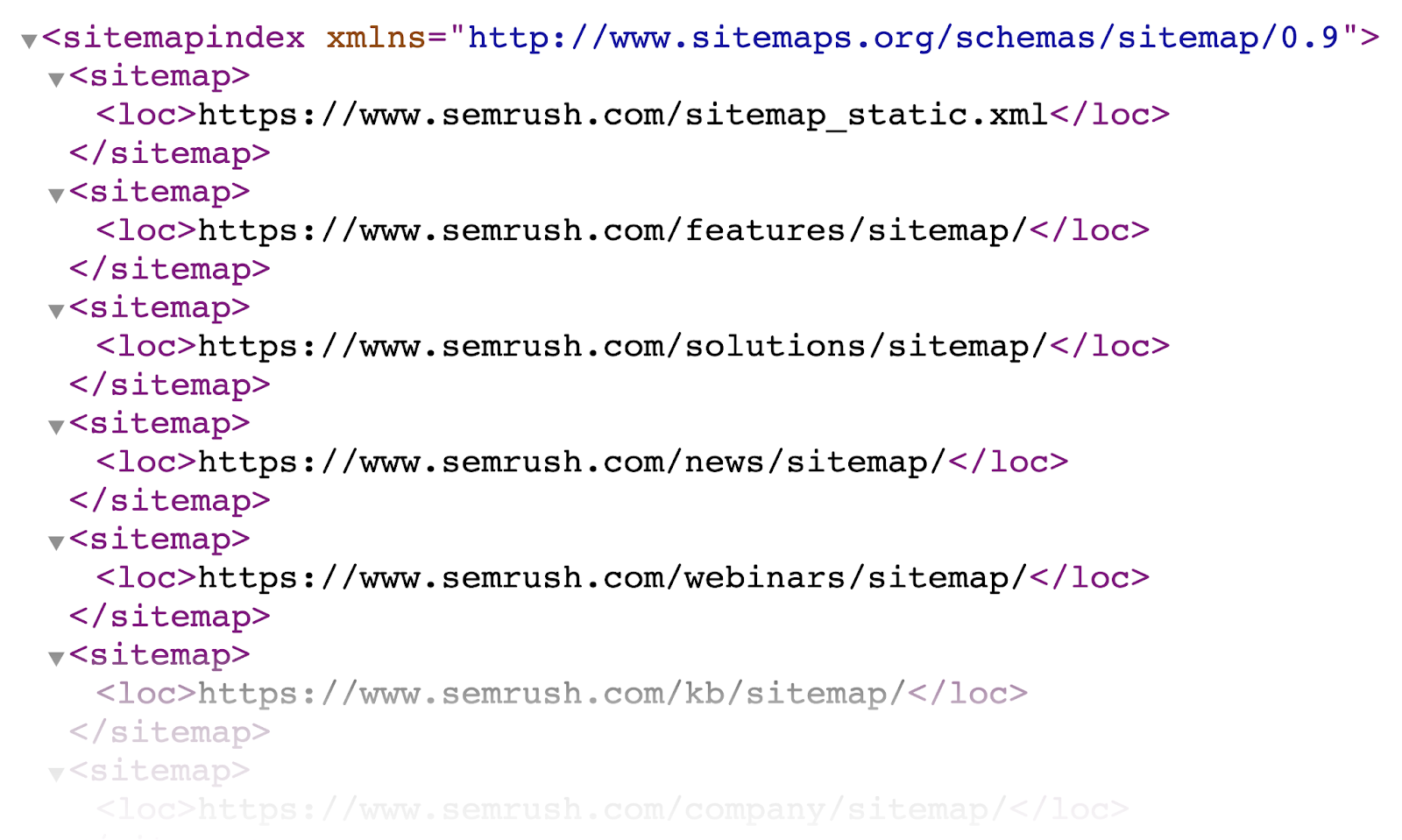
6. Web page Design and Usability
Website positioning-friendly web page design ensures each engines like google and guests have expertise.
Listed here are some fundamental guidelines to verify your pages ship a optimistic expertise:
- Construct for web page expertise indicators: Google’s page experience signals measure how properly a web page matches customers’ expectations. Key indicators embrace issues like Core Internet Vitals, mobile-friendliness, and HTTPS encryption.
- Use correct headings: HTML heading tags (H1, H2, and many others.) assist crawlers perceive the hierarchy of data on a web page. A correctly nested heading construction makes your content material simpler to grasp.
- Reduce off-page content material components: JavaScript and iframes are each used to tug content material from elsewhere onto a web page. They are often helpful to make websites richer, however additionally they sluggish web page load instances and diminish the expertise in the event that they don’t load correctly.
The next video discusses Google’s expectations in relation to web page expertise indicators:

Prioritizing above-the-fold content material can be vital for good web site design. As a result of it presents customers worth as rapidly as doable.
This sometimes entails ensuring there’s related, helpful data displayed instantly. Customers shouldn’t must scroll to see what’s most vital.
Good above-the-fold content material makes it clear what the web page is about, presents customers navigation choices, and has few distractions that might take them away from the web page.
Like this:
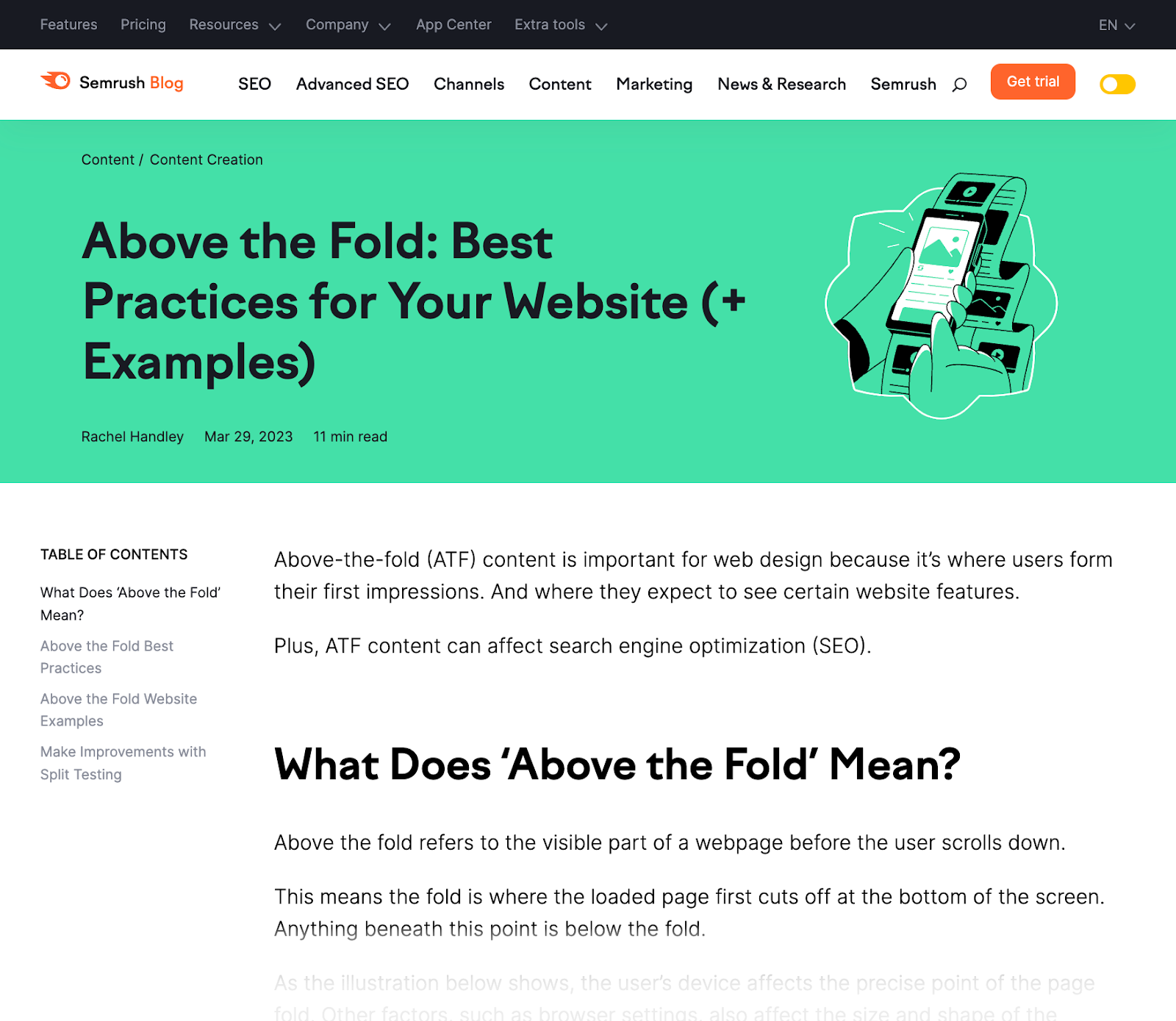
7. Accessibility
Search engines like google don’t contemplate accessibility a direct rating issue that they bake into their search rating algorithms.
Why?
As a result of it’s arduous to tie it to concrete metrics.
However accessibility does have an effect on a recognized rating issue: consumer expertise.
So, it’s vital to think about accessibility when creating an Website positioning-friendly web site.
Google has its personal accessibility guidelines, which embrace:
- Leveraging picture various textual content: Different textual content (referred to as an alt tag) describes the picture in order that display screen readers can learn it aloud to visually impaired customers.
- Utilizing high-contrast colours: Excessive colour distinction in web site design makes it simpler to differentiate between textual content, background, and pictures. Refined colour mixtures, like grey textual content on a white background, make your web page more durable to learn.
- Making certain font legibility: Your alternative of font dimension and textual content alignment have an effect on how legible content material is in your web site. Use a minimal of 16px font dimension and left alignment to make sure your web page is simple to learn.
You’ll be able to run fundamental accessibility assessments in your web site utilizing the Google Lighthouse browser extension. It’ll inform you the place your web site falls brief, guiding you on attaining most accessibility.
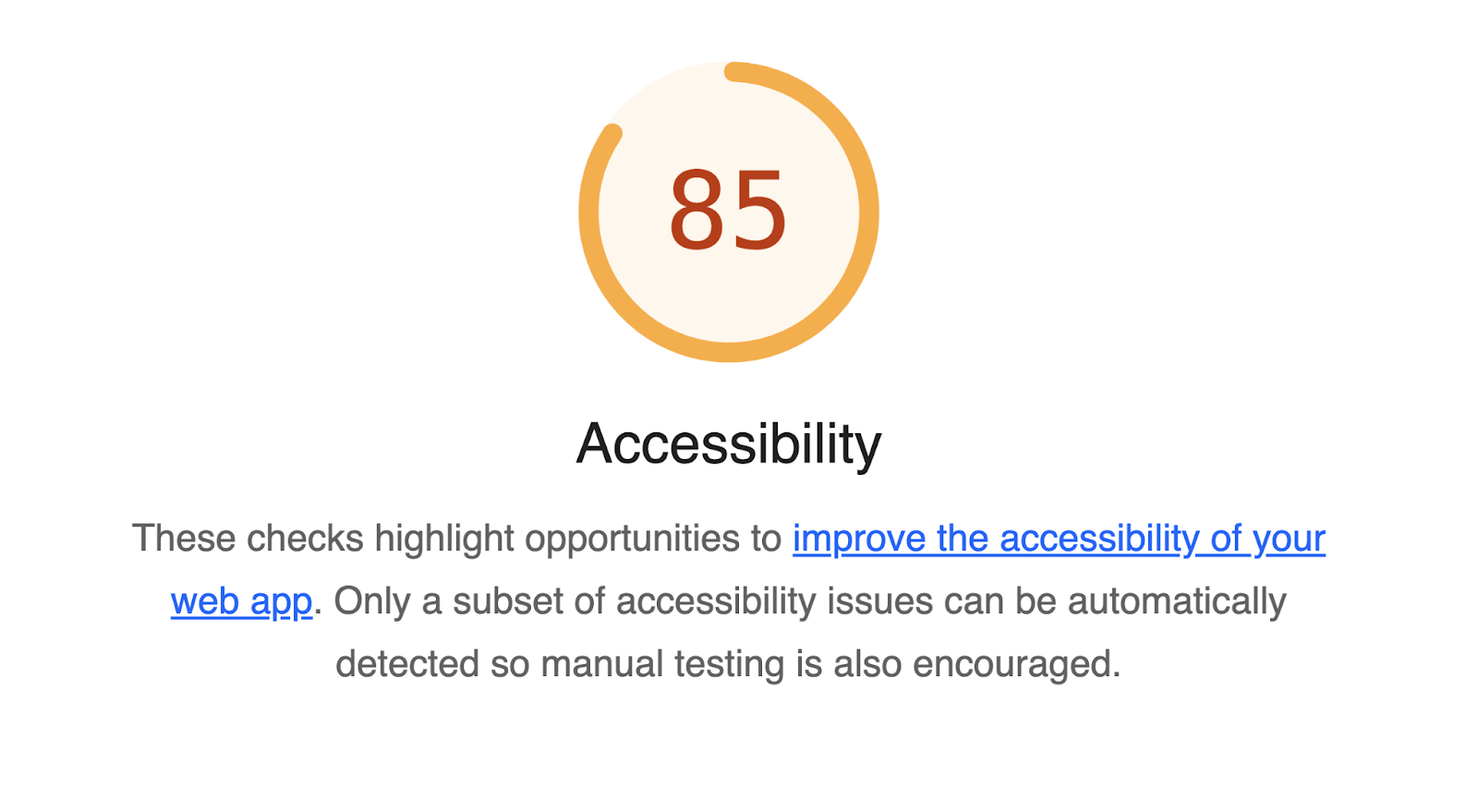
8. Schema Markup
Schema markup is a structured knowledge language that describes components in your web site in a means that engines like google perceive.
Search engines like google can use schema to tug helpful data from webpages immediately onto search engine outcomes pages (SERPs). And provides searchers higher outcomes.
Implementing schema additionally presents the chance to achieve rich results—search outcomes that embrace added visible or interactive components.
Google is ready to use that structured knowledge to show issues like FAQs, how-to sections, and evaluations.
For instance, the picture under exhibits a search outcome with the corresponding evaluations:

Implementing schema in your web site is comparatively easy, particularly when dealt with as a part of the design course of.
Use Google’s Structured Data Markup Helper to generate schema.
After you choose your knowledge sort and enter your URL, the instrument will load your web page and help you mark it up.
It seems to be like this:
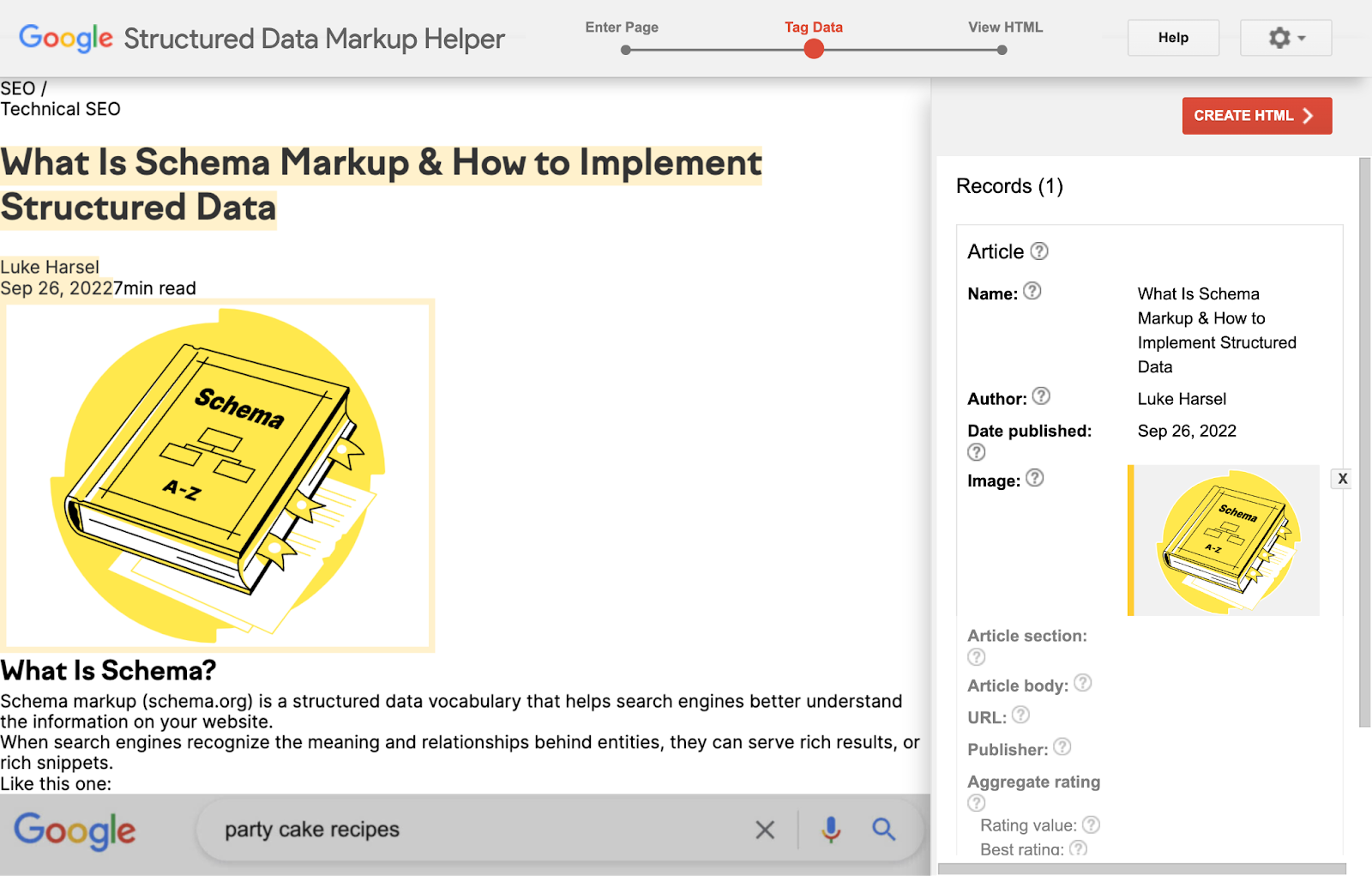
When you’re finished, click on “CREATE HTML” to obtain the code you’ll add to your web site.
And you should use the Rich Results Test instrument to verify your Schema is utilized correctly and may feed into wealthy outcomes on reside SERPs.
Enter the URL or code to see whether or not there are any errors it’s worthwhile to repair.
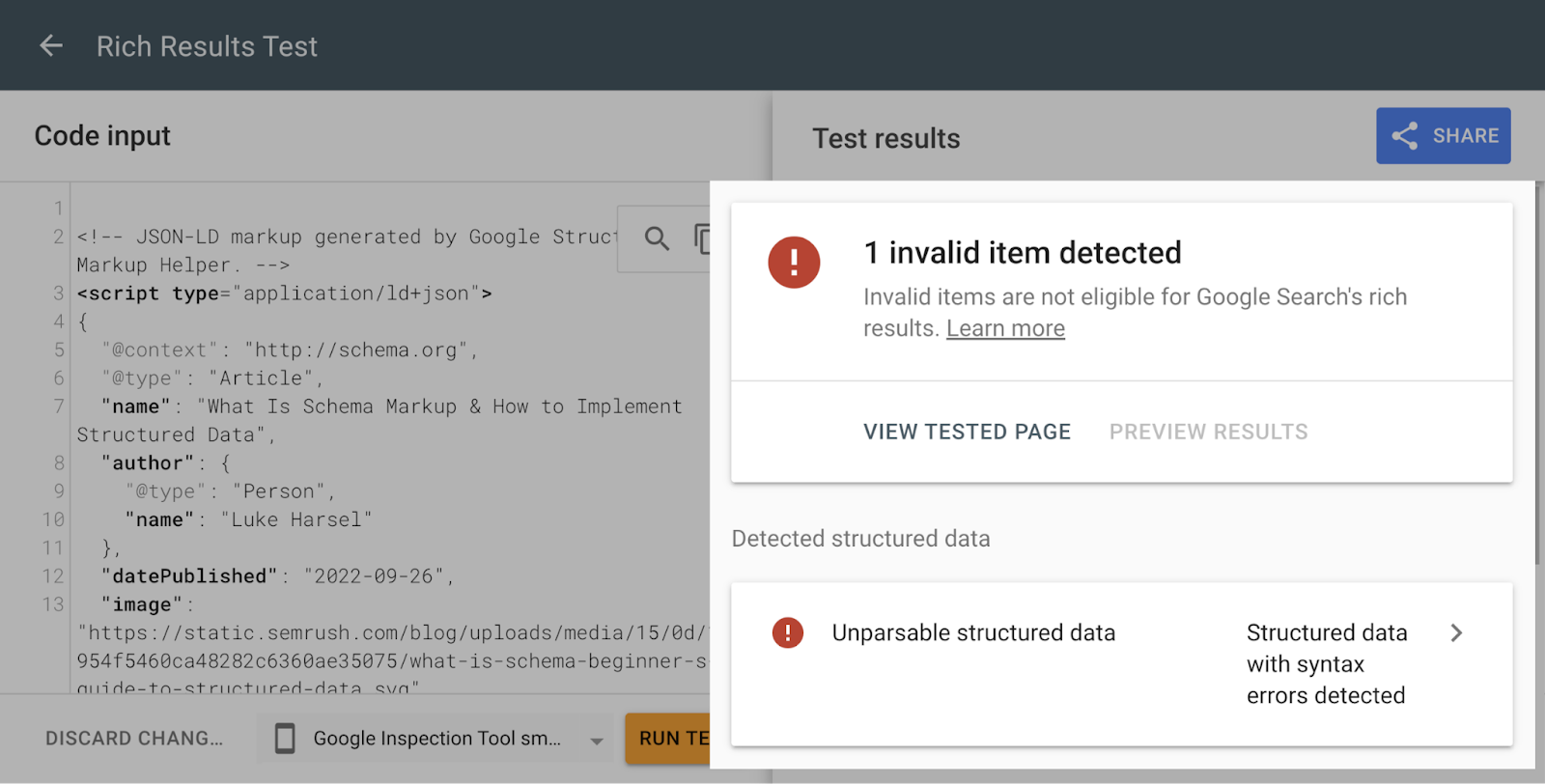
9. Photographs
Optimizing images for SEO through the web site design stage means you possibly can achieve extra site visitors from picture searches.
Picture Website positioning revolves round some fundamental ideas, which Google covers in its guide to image optimization.
Within the video under, Google’s John Mueller covers the complete advantages of optimizing photos:

To benefit from picture search alternatives, guarantee that each picture in your web site has:
- A descriptive file identify: Substitute generic, non-descriptive file names (like image123.jpg) with a concise description of the picture (like black-ford-bronco.jpg)
- An applicable file format: Use the best format for photos relying on their dimension and high quality, akin to PNG, JPEG, and WebP
- Optimized picture alt textual content: Use the alt textual content attribute to optimize for search and make the picture accessible for individuals utilizing display screen readers by offering a brief description of the picture
How Website positioning-Pleasant Internet Design Can Assist Your Enterprise
Designing a web site with Website positioning ideas as tips impacts the consumer expertise and advantages your online business’s efficiency.
The core advantages embrace:
Boosting Your Visibility
Beginning your internet design with Website positioning in thoughts ensures the web site you’re constructing has a greater likelihood of capturing natural (unpaid) site visitors.
All the guidelines above maximize your probabilities of rating on your goal key phrases.
Specializing in creating high quality content material and growing a wholesome backlink profile will even enhance your probabilities of getting extra natural site visitors.
Future-Proofing Your Web site
Contemplating Website positioning as a core a part of the web site design course of means you’ll have a powerful basis for optimization.
There are lots of adjustments to the search algorithm yearly, starting from minor tweaks to important overhauls.
Beginning with Website positioning in thoughts will make it simpler to maintain up with future updates.
Making a Good Impression
A web site optimized for search can be optimized for customers. And leaves them with a optimistic impression.
In reality, 50% of people imagine web site design is essential to general model notion.
So, taking the time to construct a web site based mostly on Website positioning ideas could be good on your model status. And enhance the probabilities that customers will return.
Website positioning + Internet Design Can Enhance Your Web site’s Potential
Designing and constructing your web site in keeping with Website positioning greatest practices ensures you’ve geared up your web site for top efficiency.
Able to get began?
Be sure to have the best instruments for the job. You’ll be able to strive Semrush at no cost.
[ad_2]
Source link






